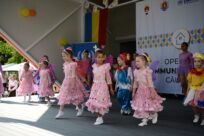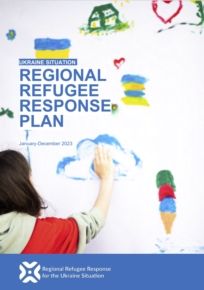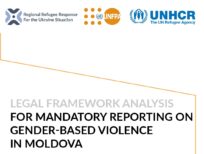Moldova Participatory Assessment Report 2022
The Republic of Moldova, a front-line state to the war in Ukraine, has received nearly 750,000 refugees and Third Country Nationals (TCN) since the Russian invasion of Ukraine on 24 February 2022. While most arrivals have continued westward to countries in the European Union, over 102,00 Ukrainian refugees[1] and around 6,000 third-country nationals have chosen to remain in Moldova, trying to rebuild their lives in their country of refuge until they are able to return home. They join around 750 refugees and asylum-seekers from other countries and around 1,900 stateless persons who also reside in Moldova.
Those seeking protection in Moldova bring with them their own capacities and needs. Their backgrounds and profiles are varied. Among those from Ukraine, 60% are female, 39% are children, and 22% are older persons. They include persons with disabilities, LGBTQI+ individuals, and ethnic Roma. Some have endured trauma in their home countries, and many have been separated from family. Some have minimal education, while others have university degrees. Non-Ukrainian refugees and asylum-seekers come from over 40 different countries, including countries in eastern Europe, Africa, the Middle East, and Latin America.
To effectively provide protection and services to those seeking protection in Moldova, it is incumbent upon the government and the humanitarian community to understand and appreciate the breadth of experiences, backgrounds, and needs among those who are here. As part of its ongoing dialogue with the refugee community in Moldova, UNHCR conducted a participatory assessment with refugees, asylum-seekers and stateless persons in October-November 2022, to deepen its understanding of the protection risks faced by these communities, learn about their local capacities, and listen to their proposed solutions. A total of 43 focus group discussions (FGDs) and one semi-structured discussion were conducted by UNHCR, in coordination and cooperation with other local and international NGOs, with over 340 individuals participating.
These discussions were organized to allow those with specific profiles to speak freely and openly about their experiences. Separate sessions were held with women and men, persons with disabilities, older persons, teenagers and youth, ethnic Roma, LGBTQI+ individuals, refugees, and asylum-seekers from countries other than Ukraine, stateless persons, and able-bodied persons. 73% of the FGs participants were female, reflecting the gendered nature of the Ukrainian refugee crisis overall. The exercise covered 15 raions (districts) in the Republic of Moldova, including the region. Participants lived in urban and rural areas, in government accommodation centres, and in private accommodations.
The refugees, asylum-seekers and stateless persons who participated in the participatory assessment had much to share about their experiences thus far in Moldova, as well as their views on the humanitarian response on issues ranging from housing, medical care, education, and social services. A summary of what was learned is provided below, with more details provided in the report itself. Recommendations on actions to be taken by the government of Moldova, civil society, and the humanitarian community, including UNHCR, are included at the end of the report.
The assessment below is a snapshot of needs and capacities. It is known that these will change over time and that communications with refugees and others in need of international protection must be ongoing. One significant development since the participatory assessment was conducted was the decision of the government of Moldova in mid-January 2023 to grant Temporary Protection (TP) to displaced Ukrainians and certain third county nationals in Moldova, effective 1 March 2023. This is a positive development, which will give Ukrainians a more stable legal status in the country and the opportunity to integrate into Moldovan society more fully. UNHCR intends to conduct another participatory assessment in the summer of 2023 to better understand how this legal status has affected the lives of Ukrainian refugees in the country and where additional efforts are needed.
[1] For purposes of this report, the term “refugees” includes Ukrainians displaced from Ukraine since 24 February 2022 and whose legal status in Moldova is currently controlled by the emergency law in the country and, as of 1 March 2023, the temporary protection regime. There are also approximately 3,190 active asylum claims submitted by Ukrainian citizens in the Republic of Moldova as of 31 December 2022.
Read the full report
-

Regional dialogue on protection and inclusion of ethnic Roma refugees and host communities
31 Aug 2024On 11-12 April 2024, during “Amare Amala: Roma Culture Week” in the Republic of Moldova, the Ministry of Education and Research (MER) of the Republic of Moldova, the Agency for Inter-Ethnic Relations, the United Nations High Commissioner for Refugees (UNHCR) and the Roma Task Force, with the support of the […]
-

PARTICIPATORY ASSESSMENT 2023
26 Feb 2024As part of its ongoing commitment to actively engage with forcibly displaced and stateless people, UNHCR conducted a Participatory Assessment (PA) in October 2023 to gain deeper insights into the protection risks faced by these communities. This assessment aimed to understand local capacities, gather feedback and explore possible solutions to […]
-

Regional Refugee Response Plan – January-December 2023
30 Mar 2023Now approaching the one-year mark since the escalation of hostilities, the war in Ukraine has resulted in a displacement and humanitarian crisis of epic proportions. The response by the refugee-hosting countries has been characterized by a spirit of welcome and unwavering generosity, with families and communities opening their doors to […]
-

Legal Framework Analysis for Mandatory Reporting on Gender-Based Violence in Moldova
10 Mar 2023The Legal Framework Analysis for Mandatory Reporting on GBV in Moldova is part of the Gender-Based Violence Sub-Working Group (GBV SWG) Technical Guidance on the Prevention and Response to GBV in Humanitarian Settings, developed by the members of the GBV Sub- Working Group. The Technical Guidance Document aims at supporting […]
